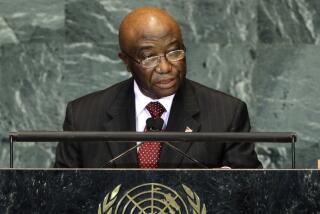‘I’m Very Happy to Succeed’
- Share via
LUBUMBASHI, Zaire — From his stronghold in southeastern Zaire, rebel-leader-turned-president Laurent Kabila had this to say Saturday of his stunning victory: “I’m very happy to succeed.”
Kabila, announcing that he is Zaire’s new head of state, declared that his Alliance of Democratic Forces for the Liberation of Congo-Zaire took over the reins of power when attempts at a diplomatic solution to the country’s seven-month civil war failed.
“I think we will succeed politically,” a smiling Kabila told journalists here. “We are confident.”
By noon Saturday, rebel troops had started to march into the capital, Kinshasa. Former President Mobutu Sese Seko was already on his way into exile. Kabila announced that a transitional government would be created within 72 hours and a new constitutional assembly set up within 60 days. The country’s old constitution has been suspended.
Government troops and special forces remaining in Kinshasa were urged to lay down their arms, while Mobutu administration officials were advised to remain in their positions until they are issued instructions by the new government.
Kabila also appealed to residents of Kinshasa to stay calm and to avoid violence. Acts of revenge will not be tolerated, he said; violators will be severely punished.
Kabila said he had spoken to military generals by phone and that they had accepted him as their new commander in chief. Although some of Mobutu’s special forces stationed in the capital were refusing to give up their weapons, the rebel leader said he was confident that there would be little resistance.
“First of all, it’s not an army,” he said. “It’s just a group of robbers that we are going to crush down very soon.”
While rebel supporters were reportedly preparing for a victory celebration, the dusty streets of Lubumbashi remained quiet. Some residents of the mining city--which sources say has been slated to become the new capital, which will be renamed Congo Kinshasa--remained cautious about Kabila.
“There are some shadows on Kabila’s personality and on the alliance itself,” said Guy Maginzi, a lawyer at Lubumbashi’s National Bank. “He has been away for 30 years and is not aware of all the problems we had here in Zaire.”
Maginzi also voiced skepticism about members of the Zairian diaspora who have come home and are jockeying for positions in the new government. “We know nothing about them, and they know nothing about the real situation here,” he said. “We do not blindly accept Kabila; it is the hatred we had toward Mobutu. Kabila’s main task is to convert that hatred into love for himself.”
Jean Paul Biruru, a professor of African linguistics and literature at the University of Lubumbashi, echoed Maginzi’s sentiments. He said he is satisfied with Kabila “as someone who is just deputizing during this transition period” but added that the political battle is far from over.
*
Biruru said changes have to occur in the basic attitudes of Zairians, who had grown accustomed to mobster-style rule. “Before telephones, new roads, hospitals and schools, they have to change mentality,” Biruru said. “Human dignity must be restored--and national pride.”
Kabila acknowledged that several challenges lie ahead as he begins to mold his new country, but he stressed that all Zairians will play a role in the process.
“Our revolution is a revolution of forgiveness,” he said. “We have forgiven so many people.”
More to Read
Sign up for Essential California
The most important California stories and recommendations in your inbox every morning.
You may occasionally receive promotional content from the Los Angeles Times.











